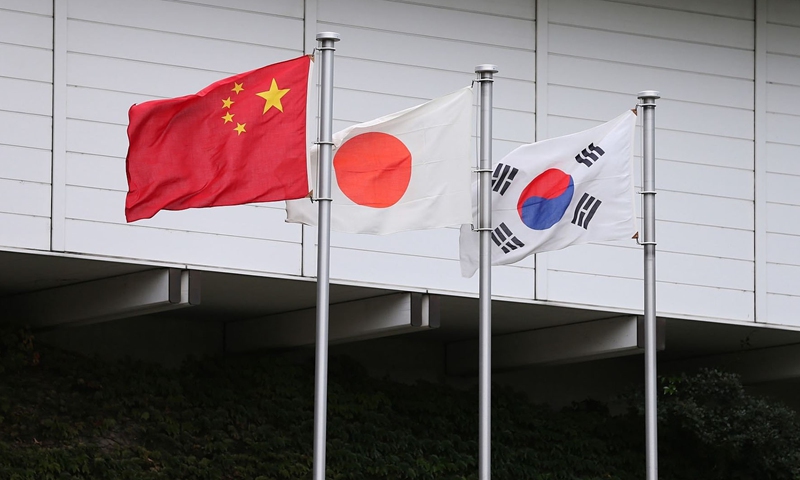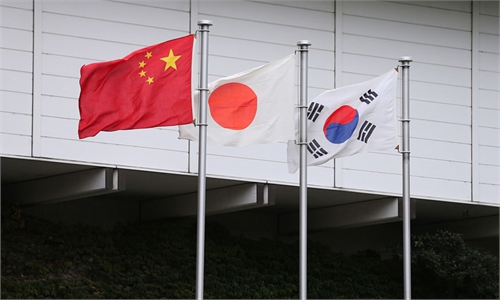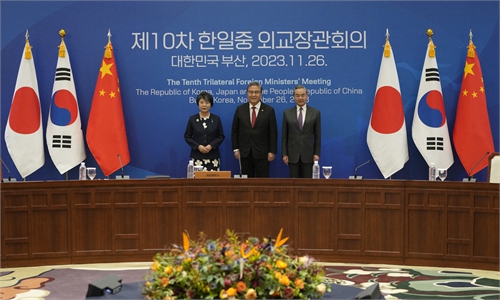Premier Li to attend China-Japan-S.Korea trilateral summit meeting
Resumption of cooperation ‘a good sign’, but ‘don’t step on Beijing’s red line’

China Japan South Korea File photo:CGTN
Chinese Premier Li Qiang will be attending the 9th trilateral summit meeting between China, Japan and South Korea in Seoul from May 26 to 27, the Chinese Foreign Ministry announced on Thursday. The resumption of the meeting after over four years' suspension is "an encouraging sign," experts said, while noting that risks brought by geopolitical games and external interference remain. They warned Japan and South Korea not to step on China's red line regarding the Taiwan question.Premier Li Qiang, together with leaders of Japan and South Korea, will attend the upcoming trilateral summit meeting, the China-Japan-South Korea business summit and other important events and exchange views on China-Japan-South Korea cooperation, Wang Wenbin, the Foreign Ministry spokesperson, said at Thursday's media briefing.
With complex changes unfolding in our region and beyond, we hope that the forthcoming summit meeting will inject new impetus into the trilateral cooperation and provide better ways towards mutual benefit for the three countries, Wang said.
China stands ready to work with Japan and South Korea to implement the Trilateral Cooperation Vision for the Next Decade and other important common understandings, deepen economic and trade, sci-tech and cultural cooperation to advance regional economic integration in East Asia and promote regional and global peace, stability and prosperity, the spokesperson added.
China, Japan and the ROK are neighbors and major economies in Asia and the world. In the course of jointly tackling the Asian financial crisis, our three countries launched trilateral cooperation. Twenty-five years on, we have put in place a China-Japan-ROK cooperation framework centering on the summit meeting and supported by ministerial meetings, senior officials' meeting and over 70 working-level mechanisms.
Chinese experts lauded the trilateral cooperation mechanism, saying it held great importance as the three neighboring countries are inseparable and have a high degree of complementarity. "The three economic powerhouses have a common desire for cooperation, just as the saying goes, 'unity brings benefits, while discord leads to harm'," Lü Chao, an expert on the Korean Peninsula at the Liaoning Academy of Social Sciences, told the Global Times on Thursday.
The reasons for a hiatus of nearly four and a half years are quite obvious. Apart from the COVID-19 pandemic, significant changes in the international landscape and the differing stances among the three on various global issues, as well as tense China-US relations, have all played a major role, observers noted.
In light of this, the resumption of this meeting is indeed an uplifting development that indicates a hard-won consensus on reinstating cooperation. Lü believes it can gradually push the East Asian region into the center of the global economy, while also stimulating global economic growth.
"Overall, the restart of the meeting presents more opportunities than challenges, it's more about communication rather than friction," Da Zhigang, director of the Institute of Northeast Asian Studies at the Heilongjiang Provincial Academy of Social Sciences, told the Global Times.
Da said consensus is likely to be reached in managing differences and promoting win-win cooperation, while advancing further trade facilitation measures including institutionally.
Observers also expect the meeting to expedite a new round of negotiations on China-Japan-South Korea free trade agreements, which, once integrated with the Regional Comprehensive Economic Partnership (RCEP), may stimulate higher levels of institutional cooperation among the three.
Nevertheless, Chinese analysts warned of a number of remaining risks that would hinder trilateral cooperation, including Tokyo and Seoul's geopolitical games, in which they serve the US "Indo-Pacific strategy" while also exerting their own regional influence by meddling in China's internal affairs regarding the South China Sea and the Taiwan question.
Another major influencing factor is the US, which does not wish to see the three Asian countries join hands, and it has spared no effort interfering in regional issues that led to the disruption of this trilateral mechanism, Lü warned.
Chinese ambassador to Japan Wu Jianghao on Monday voiced strong opposition to Japan's sending more than 30 parliamentarians to Taiwan region to "congratulate" the new regional leader at a so-called inauguration ceremony.
Also on Thursday, Foreign Ministry spokesperson Wang Wenbin reiterated that the Taiwan question is at the very core of China's core interests. It bears on the political foundation of China-Japan relations and is a red line that must not be crossed.
Some in Japan have been making negative moves on Taiwan, including repeating the preposterous and dangerous notion that "any contingency for Taiwan is a contingency for Japan", which seriously violates the spirit of the four political documents between China and Japan and the commitments Japan has made, Wang said.


